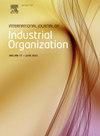通过产业政策塑造偏好:西班牙的加那利群岛
IF 1.4
3区 经济学
Q2 ECONOMICS
International Journal of Industrial Organization
Pub Date : 2025-09-01
DOI:10.1016/j.ijindorg.2025.103170
引用次数: 0
摘要
西班牙政府在1939年至1986年间实行了一项激进的、长达数十年的自给自足政策,实际上禁止了西班牙大部分地区的汽车进口。我们利用加那利群岛独特的体制财政制度来评估这种自给自足的工业政策对西班牙生产的汽车在国内销售的影响。加那利群岛数百年的自由港制度允许岛上居民进口商品。这导致加那利群岛的汽车销售构成与西班牙其他地区截然不同。在西班牙加入欧盟多年后,各地区之间的关税差异被逐步取消,加那利人对西班牙本土品牌的忠诚才与西班牙其他地区的品牌趋同。我们使用历史省级汽车登记数据进行的分析显示,1972年至1986年间,进口限制占西班牙国内销售增长的33%。本文章由计算机程序翻译,如有差异,请以英文原文为准。
Shaping preferences through industrial policy: The Canary Islands in autarkic Spain
The Spanish government pursued an aggressive, decades-long, autarkic policy that effectively banned automobile imports in most of Spain between 1939 and 1986. We take advantage of the Canary Islands' unique institutional fiscal regime to evaluate the effect of this autarkic industrial policy on domestic sales of automobiles produced in Spain. The archipelago's centuries old free-port regime allowed Canarian islanders access to imports. This resulted in a very different composition of automobile sales in the Canary Islands relative to other Spanish regions. Canarians' loyalty to Spanish domestic brands only converged to those of the rest of Spain years after Spain joined the European Union, once the tariff differential across regions was phased-out. Our analysis using historical provincial automobile registration data shows that import restrictions are responsible for 33% of additional domestic sales in Spain between 1972 and 1986.
求助全文
通过发布文献求助,成功后即可免费获取论文全文。
去求助
来源期刊
CiteScore
2.50
自引率
6.70%
发文量
48
审稿时长
77 days
期刊介绍:
The IJIO is an international venture that aims at full coverage of theoretical and empirical questions in industrial organization. This includes classic questions of strategic behavior and market structure. The journal also seeks to publish articles dealing with technological change, internal organization of firms, regulation, antitrust and productivity analysis. We recognize the need to allow for diversity of perspectives and research styles in industrial organization and we encourage submissions in theoretical work, empirical work, and case studies. The journal will also occasionally publish symposia on topical issues.

 求助内容:
求助内容: 应助结果提醒方式:
应助结果提醒方式:


